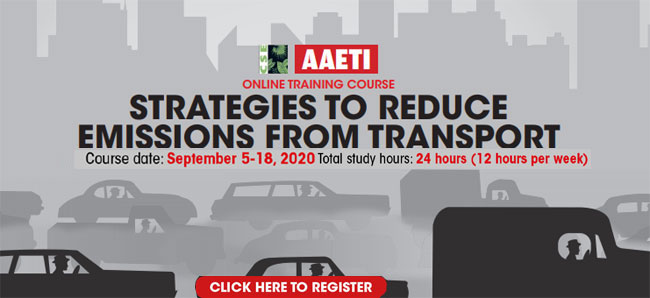
Why this course?
This programme represents our initiative to promote good regulatory practices, enhance understanding, and build capacity on strategies to reduce transport sector emissions. This has become necessary within the framework of the National Clean Air Programme (NCAP) that mandates cities which do not meet clean air standards to reduce particulate air pollution by 20-30 per cent by 2024. All city clean air action plans, therefore, have included strategies to control emissions from transport sector to meet the clean air target, as the transport sector’s contribution to overall pollution concentration, load and exposure is substantial.
This has created a demand for deeper understanding of the multi-pronged strategies needed to control vehicular pollution. These encompass emissions standard roadmaps and on-road emissions management to control real world emissions; sustainable transport modes (public transport, walking and cycling), multimodal integration, parking policy and urban planning to reduce the vehicle miles travelled. These interventions also align with the sector-specific strategies that state governments have initiated as part of other policies and programmes.
This requires deep understanding of the way these strategies need to be designed and developed for scale and effective impact for time-bound air quality improvement. Several exciting changes are underway in cities, and it is important to build capacity and a new cadre of professionals.
How is this course structured?
This course will be conducted on the Moodle/Zoom platform through a variety of tools such as video lectures, classroom exercises, reading materials and resources, audio/visual methods including short films and interviews, and interactions with key experts. The programme has been structured as follows:
Module 1
- Understanding urban air pollution, public health and transport sector emissions
Module 2
- How technology roadmaps need to evolve to reduce emissions from vehicles
- Strategies for on-road emissions management – current and new generation strategies to control real world emissions
- Towards zero-emission electric vehicles
Module 3
- Public transport strategies to reduce emissions
- Bus transport reforms and electric mobility in cities
Module 4
- Non-motorised transport strategies for zero-emissions mobility
- Urban planning, transport integration and compact urban form
Module 5
- Strategies to reduce vehicle miles travelled – designing parking policy as a demand management measure, understanding global practices like congestion charging, low emissions zones etc
Certificate of participation: Participants will be awarded certificate on completion of the course
For Register Click here
As seats are limited, registration will be on a first come-first served basis.
For more details, please contact the Training coordinator
Priyanka Chandola
Programme Manager
Clean Air and Sustainable Mobility Programme
Centre for Science and Environment
Mobile: +91-9810414938
Email: priyanka@cseindia.org